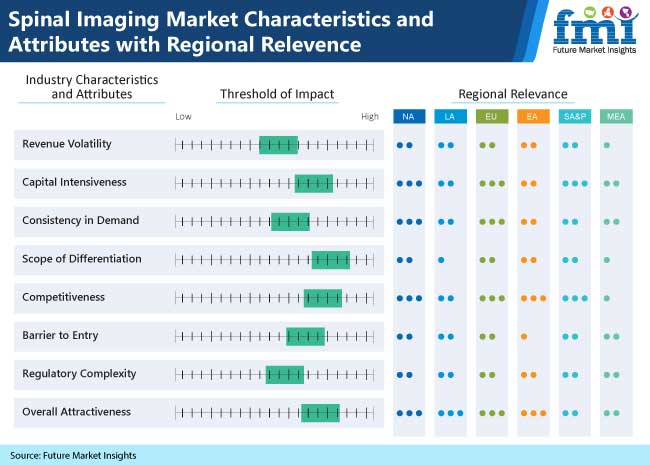
Global Spinal Imaging Industry Set for Remarkable Growth, Estimated at US$ 3.5 Billion by 2032, Riding the Technological Wave, Notes FMI
 Global Spinal Imaging Industry
Global Spinal Imaging Industry
The global spinal imaging industry is experiencing remarkable growth and transformation as technological advancements and a growing aging population continue to drive demand for innovative diagnostic tools and treatment options. This market segment is an integral part of the broader medical imaging industry, focused specifically on the visualization and assessment of spinal conditions and disorders.
One of the primary drivers behind the spinal imaging industry’s growth is the increasing prevalence of spinal ailments and the need for early detection and intervention. Conditions like herniated discs, spinal stenosis, and degenerative disc disease are becoming more common as the population ages, putting pressure on healthcare systems to provide efficient diagnostic and therapeutic solutions.
Get your Sample Report with Latest Market Information! https://www.futuremarketinsights.com/reports/sample/rep-gb-11935
The spinal imaging industry is anticipated to generate sales of US$ 2.2 billion by the end of 2022, and it is projected to reach US$ 3.5 billion by the end of 2032. From 2022 to 2032, the market for spinal imaging is anticipated to expand at a 4.8% CAGR. Advancements in imaging technologies have revolutionized the way spinal conditions are diagnosed and managed. Traditional methods like X-rays and CT scans have been augmented by more advanced techniques such as magnetic resonance imaging (MRI) and ultrasound, offering higher resolution and improved clarity in spinal imaging. These technologies enable healthcare professionals to make more accurate diagnoses and tailor treatment plans to individual patient needs, ultimately leading to better outcomes.
Additionally, the adoption of minimally invasive surgical techniques for spinal procedures has further fueled the demand for high-quality spinal imaging. Surgeons rely on real-time imaging guidance to perform delicate procedures with precision, reducing patient trauma and recovery times. As a result, the spinal imaging industry is witnessing increased investments in research and development to enhance imaging modalities and support these minimally invasive approaches.
The Spinal Imaging Market is also benefiting from the integration of artificial intelligence (AI) and machine learning algorithms into imaging systems. These technologies assist radiologists and clinicians in the interpretation of complex spinal images, leading to faster and more accurate diagnoses. AI-driven solutions have the potential to revolutionize the field by automating routine tasks, improving diagnostic accuracy, and optimizing workflow efficiency.
Key Components And Technologies Within The Spinal Imaging Industry Include:
- X-ray Imaging: Traditional X-ray imaging remains a fundamental tool for assessing spine-related issues such as fractures, dislocations, and scoliosis.
- CT (Computed Tomography) Scan: CT scans provide detailed cross-sectional images of the spine, allowing for a more comprehensive evaluation of spinal conditions, including herniated discs, tumors, and spinal stenosis.
- MRI (Magnetic Resonance Imaging): MRI is a powerful tool for assessing soft tissues in and around the spine. It is often used to diagnose conditions such as disc herniations, spinal cord injuries, and tumors.
- Ultrasound: While less common for spinal imaging, ultrasound can be used to evaluate certain aspects of the spine, especially in pediatric patients.
- Fluoroscopy: This real-time imaging technique is used during procedures such as spinal injections and surgeries to guide the placement of instruments or to monitor the spine’s movement.
- Nuclear Medicine: Nuclear imaging, including techniques like SPECT (Single Photon Emission Computed Tomography) and PET (Positron Emission Tomography), can provide valuable information for assessing spinal disorders and detecting tumors or infections.
- Endoscopy: Minimally invasive endoscopic procedures can be used for both diagnostic and surgical purposes in spinal care. Endoscopes provide direct visualization of the spine’s interior, allowing for targeted interventions.
Should You Have Any Queries, Our Analyst Is Here To Assist You! https://www.futuremarketinsights.com/ask-question/rep-gb-11935
Some of the companies profiled in the report are:
- Canon Medical Systems Corp.
- GE Healthcare
- FUJIFILM
- Siemens Healthineers
- Koninklijke Philips N.V.
- Bruker
- Shimadzu Corp.
- Mediso Ltd.
- Toshiba Medical Systems, Inc.
- Hitachi, Ltd.
Spinal Imaging Industry Segmentation:
Product Type
- X-ray
- CT
- MRI
- Ultrasound
Application
- Spinal Infection
- Vertebral Fractures
- Spinal Cancer
- Spinal Cord and Nerve Compression
End User
- Hospitals
- Diagnostic Imaging Center
- Ambulatory Care Center
Region
- North America
- Latin America
- Europe
- East Asia
- South Asia
- Oceania
- MEA
Tailor-Made Solutions: Our Customization Report Reveals the Key to Success! https://www.futuremarketinsights.com/customization-available/rep-gb-11935
About Future Market Insights (FMI)
Future Market Insights, Inc. (ESOMAR certified, recipient of the Stevie Award, and a member of the Greater New York Chamber of Commerce) offers profound insights into the driving factors that are boosting demand in the market. FMI stands as the leading global provider of market intelligence, advisory services, consulting, and events for the Packaging, Food and Beverage, Consumer Technology, Healthcare, Industrial, and Chemicals markets. With a vast team of over 5000 analysts worldwide, FMI provides global, regional, and local expertise on diverse domains and industry trends across more than 110 countries.
Contact Us:
Future Market Insights Inc.
Christiana Corporate, 200 Continental Drive,
Suite 401, Newark, Delaware – 19713, USA
T: +1-845-579-5705
For Sales Enquiries: sales@futuremarketinsights.com
Website: https://www.futuremarketinsights.com
LinkedIn| Twitter| Blogs | YouTube
Editor Details
-
Company:
- MARKITWIRED
- Website:
